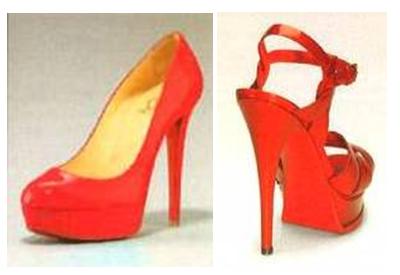 Plaintiff Christian Louboutin’s (left) and
Plaintiff Christian Louboutin’s (left) and
defendant Yves Saint Laurent’s red soled shoes
The Washington Post Thursday reported on an interesting trademark lawsuit.
Women’s shoe designer Christian Louboutin has sued designer Yves Saint Laurent in the Southern District of New York over the latter’s use of red soles on its women’s shoes.
Christian Louboutin has a registered trademark for the color red in connection with the shape of the soles of women’s shoes. It’s Reg. No. 3376197; it’s been on the books in the United States since January 2008, with a claimed priority date of March 8, 2006. The complaint alleges Christian Louboutin has been the substantially exclusive user of red soles on women’s shoes in the United States since 1992.
Christian Louboutin alleges that Yves Saint Laurent’s soles are confusingly similar with plaintiff’s “Red Sole Mark.” The complaint goes so far as to allege that YSL is selling counterfeit Louboutin shoes.
But back to the article. It provides a good summary of the trademark principles at issue, something I love seeing in the mainstream press.
In short, Louboutin’s Red Sole Mark needs to have secondary meaning if it’s to be protected under U.S. trademark law as a color mark. That’s from the Supreme Court’s decision in Qualitex Co. v. Jacobson Prods. Co., 514 U.S. 159 (1995). But if the color mark has acquired secondary meaning — meaning that consumers associate the color with a single source — and the color serves no functional purpose, including an aesthetic purpose, then the color is perfectly protectable as a trademark. Think Tiffany’s robin’s egg blue color, also a registered (and extremely valuable) trademark.
Whether Louboutin’s red soles function as a trademark and don’t serve an aesthetic purpose remains to be seen. If its Red Sole Mark isn’t protectable as a trademark, it can be freely copied — at least as far as trademark law is concerned.
The fact its color mark is registered means the court will presume it’s protectable.
That said, for my money, the color’s part of the shoe’s aesthetics. But I claim no expertise in women’s footwear. None whatsoever.
The case cite is Christian Louboutin S.A. v. Yves Saint Laurent America, Inc., No. 11-2381 (S.D.N.Y.).